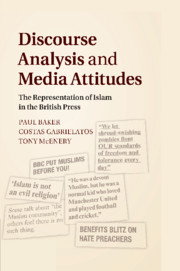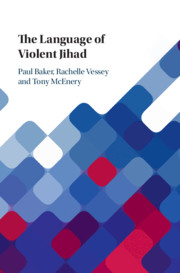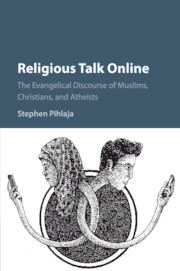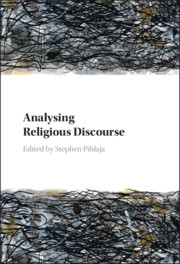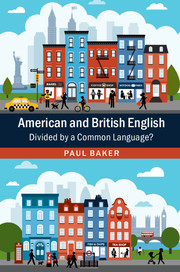Discourse Analysis and Media Attitudes
The Representation of Islam in the British Press
£30.99
- Authors:
- Paul Baker, Lancaster University
- Costas Gabrielatos, Edge Hill University, Ormskirk
- Tony McEnery, Lancaster University
- Date Published: December 2019
- availability: Available
- format: Paperback
- isbn: 9781108790611
£
30.99
Paperback
Other available formats:
Hardback, eBook
Looking for an inspection copy?
This title is not currently available on inspection
-
Is the British press prejudiced against Muslims? In what ways can prejudice be explicit or subtle? This book uses a detailed analysis of over 140 million words of newspaper articles on Muslims and Islam, combining corpus linguistics and discourse analysis methods to produce an objective picture of media attitudes. The authors analyse representations around frequently cited topics such as Muslim women who wear the veil and 'hate preachers'. The analysis is self-reflexive and multidisciplinary, incorporating research on journalistic practices, readership patterns and attitude surveys to answer questions which include: what do journalists mean when they use phrases like 'devout Muslim' and how did the 9/11 and 7/7 attacks affect press reporting? This is a stimulating and unique book for those working in fields of discourse analysis and corpus linguistics, while clear explanations of linguistic terminology make it valuable to those in the fields of politics, media studies, journalism and Islamic studies.
Read more- The largest study of news writing (covering 143 million words) about Muslims and Islam that has ever been undertaken
- Combines cutting-edge qualitative and quantitative methods
- Written clearly with many technical details in footnotes
Reviews & endorsements
'This book investigates the ways in which the lives and actions of Muslims and Islam are represented in the British press. The authors use the corpus method of analysing vast amounts of data to weigh the overall impact of the media coverage. This approach offers stimulating new insights which offer useful suggestions as to the ways in which the current situation might be improved.' Rt Hon Charles Clarke, Former UK Home Secretary
See more reviews'This study is destined to become a classic. It provides detailed evidence of how press influence works, and elegantly demonstrates the strength of corpus linguistics as a research tool.' Susan Hunston, University of Birmingham
'Understanding the representation of Islam in the Western media is a major challenge that demands a balanced approach supported by real data. The methods that enhance this book throughout are rich in insight, comprehensive in vision and evidential at their core. Integrating large corpus-linguistic-informed databases with the qualitative accents of critical discourse analysis the book underlines the centrality of language use to the way we read media discourses and results in humanities scholarship at its very best.' Ronald Carter, University of Nottingham
'This excellent and very accessible book not only provides key insights into a topic of major social and political importance, it also clearly demonstrates the power of corpus linguistics to provide hard factual evidence for critical discourse analysis. This is a major contribution, not only to understanding of Islamophobia in the UK press, but also to the social sciences and discourse analysis as a whole.' Guy Cook, King's College London
'[This book] uses corpus linguistic analysis to show how selective linguistic patterning in newspapers creates an overwhelmingly negative point of view in contemporary press coverage of Islam. Research approach and method are precisely defined, analytic techniques clearly explained and illustrated, and inferences from data weighed up in meticulous and even-handed exposition. The book demonstrates in exemplary fashion how linguistics can contribute to wider social debates; it will be of value not only to scholars and students in corpus linguistics and discourse analysis but also in other fields concerned with public representations of Islam or with problems of media responsibility.' Alan Durant, Middlesex University
'What sets this discourse analysis apart from its predecessors is its completeness: the authors' sample is not a selection of newspapers, accommodating the political stance of the outlet (left-leaning, right-leaning), the format (tabloid, broadsheet), or a narrow period; neither, having aggregated all the articles that mention the topic, do they thin the sample by random or purposive selection. Their corpus includes all the major daily newspapers and all the articles published therein that refer to Islam and Muslims between 1998 and 2009. Although the authors allow that some articles may have slipped through their net, the corpus they compiled contains 200,037 articles.' Michael B. Munnik, Journalism and Mass Communication Quarterly
Customer reviews
Not yet reviewed
Be the first to review
Review was not posted due to profanity
×Product details
- Date Published: December 2019
- format: Paperback
- isbn: 9781108790611
- length: 292 pages
- dimensions: 230 x 150 x 15 mm
- weight: 0.4kg
- contains: 40 b/w illus. 52 tables
- availability: Available
Table of Contents
1. Introduction
2. Sketching Muslims: the big picture
3. Muslim or Moslem: differences between newspapers
4. The 9/11 effect: change over time
5. Welcome to Muslim world: collectivisation and differentiation
6. What's a devout Muslim? Ways of believing
7. From hate preachers to scroungers: who benefits?
8. Burqas and brainwashing: Muslims and gender
9. Does history rhyme? Earlier news representations of Muslims
10. Conclusion.
Sorry, this resource is locked
Please register or sign in to request access. If you are having problems accessing these resources please email [email protected]
Register Sign in» Proceed
You are now leaving the Cambridge University Press website. Your eBook purchase and download will be completed by our partner www.ebooks.com. Please see the permission section of the www.ebooks.com catalogue page for details of the print & copy limits on our eBooks.
Continue ×Are you sure you want to delete your account?
This cannot be undone.
Thank you for your feedback which will help us improve our service.
If you requested a response, we will make sure to get back to you shortly.
×
